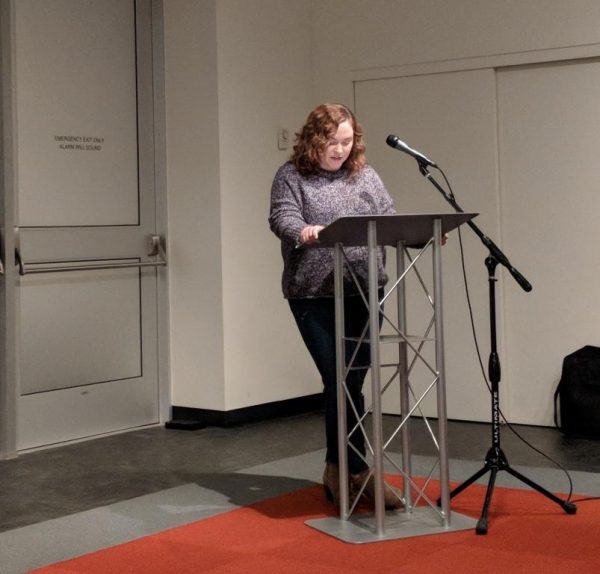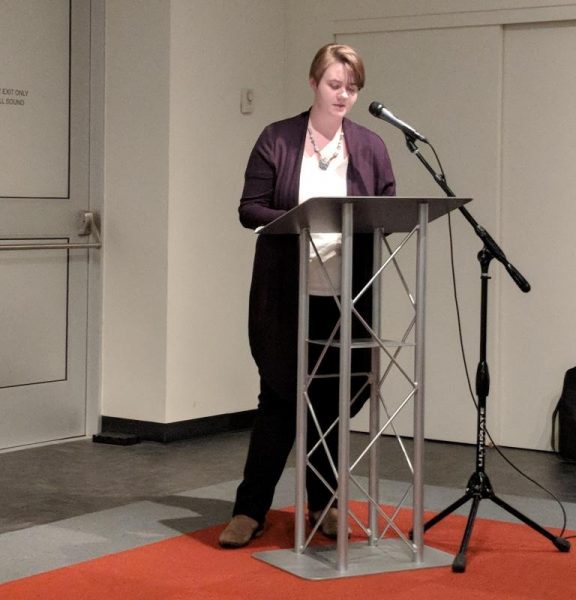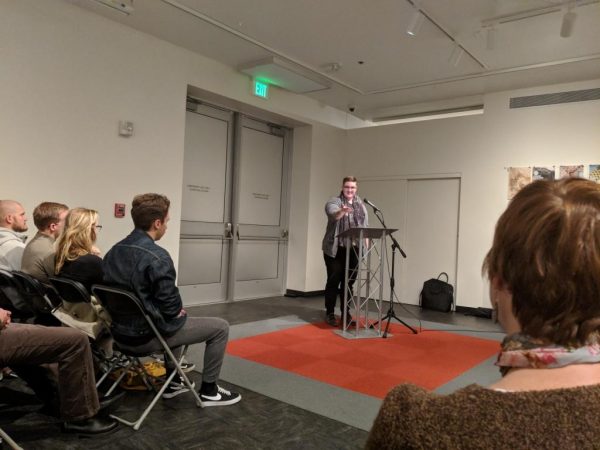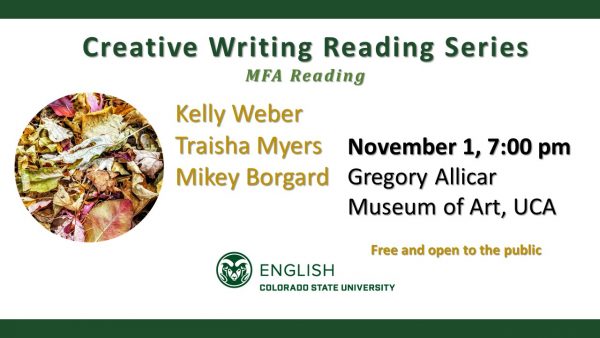The first M.F.A. thesis reading of the year took place in the Gregory Allicar Museum of Art. The three M.F.A. candidates included Kelly Weber (poety), Traisha Myers (nonfiction), and Mikey Borgard (fiction), each reading excerpts from their final thesis.
After a wonderful welcome by Matthew Cooperman, Debby Thompson introduced nonfiction writer Traisha Myers. In addition to working on her thesis and taking graduate courses, Myers works full time as a middle school teacher and is planning her upcoming November wedding. Thompson described Myers’ braided essays as a balance of “humor and self-deprecation” that challenge her readers.

Myers’s excerpt began with the image of a beautiful wedding dress, a dress ordered two sizes too small. This dress represented her own false ideal of a perfect wedding and a perfect wedding dress, a wedding dress for a different body.
Myers begins interlacing her own wedding preparation with memories of her mother and “sperm donor,” and the fear instilled in Myers by her mother’s own experience in an unfaithful relationship and as a single mother. One night, when her mother is eight months pregnant with Myers, she confronts her unfaithful husband, announces that “this baby is going to be me,” and leaves.
Myers had fears similar to her mother about marriage, but then she met Craig who changed everything. (Spoiler: Craig is the man she’s marrying this month). However that doesn’t mean Myers doesn’t still have worries. She worries about repeating her mother’s history, being too much like her mom. She worries about having the perfect wedding and wedding dress. She worries about married life.
Myers writes in a relatable way while also revealing her own intimate vulnerabilities. But through this journey, Myers finds hope and strength in her mother’s story. Now, she has the perfect wedding dress. And yes, it’s beautiful and ivory and lace.
Myers reading was followed by Kelly Weber, introduced by her advisor Sasha Steensen. Steensen described Weber as someone who is organized, proficient, tireless, and an inspiration to her readers, peers, and students. It’s not surprising that Weber is tackling two separate manuscripts: nonfiction and poetry.

Weber’s writing is an excavation of the body in crisis. As Steensen reiterated, her writing permits the world to see inside, taking a risk and showing the body in peril. This prodding appears in both Weber’s nonfiction and poetry.
Weber began with an excerpt from her nonfiction manuscript, exploring a solo road trip she took from Northern Colorado to the Garden of the Gods. Her excerpt traces origins from the beginning of time to now as she follows her vertical path across Colorado. Themes of home and the body in illness appear repeatedly in her narrative.
Alongside Weber, we grapple with the reality of being a woman. We hear stories where Weber used silence as a victory against men, but silence becomes a victory for men. We learn about the strength needed to open the body, to help other people, blood and bone. We learn how Weber opens her own body to show us these vulnerabilities.
As Weber transitioned from her nonfiction excerpt to poetry, these same themes emerged: strength, blood, bone. Weber’s balance between nonfiction and poetry allows for different explorations of the body, as her nonfiction excerpt reads like a new, poetical language. Before I’ve begun to grapple with the larger themes, Weber has shown us through her bodily exploration that she is done.
As Judy Doenges recounted, on Mikey Borgard’s first day of kindergarten, he announced that he was not learning how to read. As an M.F.A. candidate in fiction writing, he’s come a long way. There was also another story about Borgard wanting to give away his sister too, but I assume that’s for another time.

Borgard was described as an inquisitive child, stubborn, precocious, and a force of nature. But one day, April 15, 2013, changed his life. Borgard is a direct survivor of the Boston Marathon bombing, an event that became the heart of his novel. Fashioned out of truth, Borgard’s thesis is a fictive novel inspired by the events that happened at the Boston Marathon bombing. Through this work of “docufiction,” he gives us the lives and voices of survivors.
Titled Not so Dreadful Here, this “docunovel” starts with Grecian history, a recurring theme Borgard leaves traces of throughout his novel. As Borgard began, the only idiom I can think of is that it was so quiet you could hear a pin drop. Given the manuscript’s relationship to the Boston bombing, the audience braced for what was coming.
Borgard creates a moment with vivid clarity, a beautiful moment as runners and visitors prepare for the 117th Boston Marathon. This moment would be unforgettable, but not in the way anyone expected.
We meet different characters, survivors. There is a man, a veteran, with a drink for a missing brother. There is a girl leaving Fenway park, passing by the marathon festivities. Borgard engages all of our senses as the street falls silent. Even sitting in the Gregory Allicar Museum, we can feel the physical agony, the screaming, multiplying. The characters are looking for a reason, an explanation, when there is a second blast. The veteran is losing body, losing space.
Amidst this chaos is Borgard, both author and survivor. When the reading ends, the heavy silence lingers. For a moment, I sat there. There is such power in writing, something each of these three M.F.A. candidates proved. And these words can linger long after the authors have stopped reading.
Don’t miss the Writer’s Harvest on November 15, 2018 from 7:30-9 pm in the Longs Peak Room, Lory Student Center. Come hear Rebecca Brown and Chloe’ Leisure share their work. Don’t forget to bring non-perishable food donations for the Larimer County Food Bank!
